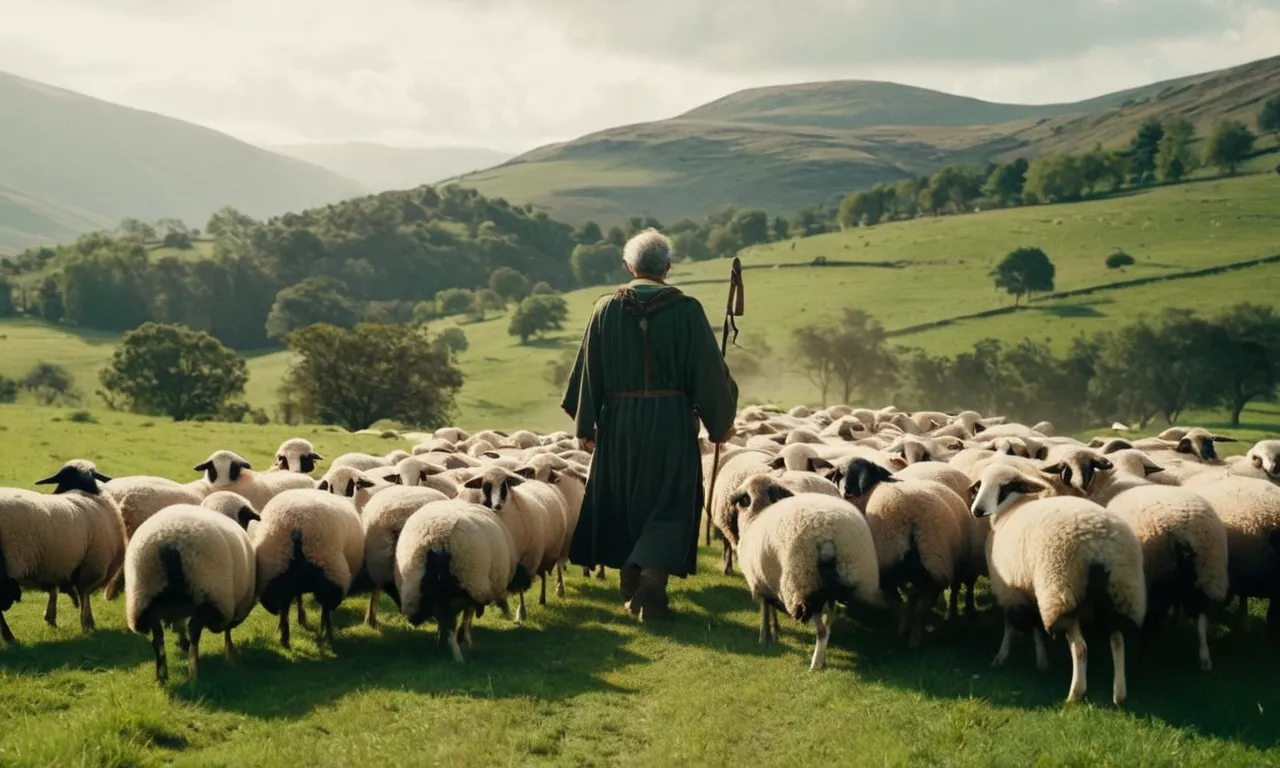Psalm 23 Meaning Line By Line: A Comprehensive Guide
In the vast tapestry of the Bible, few passages have captured the hearts and minds of believers like Psalm 23. This timeless hymn, penned by the shepherd-king David, has become a source of comfort and solace for countless individuals across generations.
Its poetic verses resonate with a profound depth, offering a glimpse into the intimate relationship between the believer and their divine Shepherd.
If you’re short on time, here’s a quick answer to your question: Psalm 23 is a poetic masterpiece that explores the theme of God’s unwavering love, guidance, and protection for His people. Through vivid imagery and metaphors, each line unveils a deeper understanding of the believer’s journey, from the lush green pastures of provision to the dark valleys of adversity, ultimately leading to the eternal dwelling in the house of the Lord.
In this comprehensive guide, we will delve into the meaning of Psalm 23 line by line, unpacking the rich symbolism and spiritual truths embedded within its verses. We will explore the historical context, literary devices, and theological significance, providing a deeper appreciation for this beloved psalm.
The Lord is My Shepherd: An Introduction to Psalm 23
Psalm 23, often referred to as the “Shepherd’s Psalm,” is a beloved and widely recognized passage from the Hebrew Bible. Its timeless words have brought comfort and solace to countless individuals throughout the ages, transcending cultural and religious boundaries.
This psalm’s profound meaning and enduring relevance have solidified its status as one of the most cherished and frequently quoted passages in all of Scripture.
Historical Context and Authorship
Traditionally attributed to King David, the author of many of the psalms, Psalm 23 is believed to have been composed during his time as a shepherd in the fields of Bethlehem. According to biblical accounts, David spent his youth tending his father’s flocks, an experience that likely shaped his understanding of the metaphorical relationship between a shepherd and his sheep.
This firsthand knowledge lends authenticity and depth to the imagery employed in the psalm. According to the NIV Study Bible, the shepherd imagery resonated deeply with ancient Israelites who were familiar with the nomadic lifestyle and the crucial role of shepherds in their society.
Literary Devices and Poetic Structure
Psalm 23 is a masterpiece of poetic expression, employing various literary devices to convey its profound message. The use of vivid imagery, such as “green pastures,” “still waters,” and “the valley of the shadow of death,” creates a powerful visual representation of the shepherd’s care and guidance.
Personification is also prominent, with the psalmist addressing the Lord as a shepherd who leads, restores, and protects his flock. The parallelism, a common feature in Hebrew poetry, enhances the rhythm and emphasizes the central themes.
For example, “He maketh me to lie down in green pastures: he leadeth me beside the still waters” (KJV) illustrates this poetic device.
Theological Significance and Relevance
At its core, Psalm 23 is a celebration of God’s unwavering love, provision, and protection for His people. The metaphor of the shepherd and his sheep serves as a powerful illustration of the relationship between God and humanity.
Just as a shepherd guides, nourishes, and safeguards his flock, the Lord is portrayed as the ultimate caregiver, providing for our physical and spiritual needs. The psalm’s message is one of trust and confidence in the face of adversity, as the psalmist declares, “I will fear no evil: for thou art with me” (KJV).
This timeless truth has resonated with believers across generations, offering hope and reassurance in times of darkness and uncertainty.
Beyond its theological significance, Psalm 23 holds universal appeal, transcending religious boundaries. Its comforting words and relatable imagery have made it a source of solace for people from all walks of life, regardless of their spiritual beliefs.
According to BibleOdyssey.org, Psalm 23 is one of the most widely recognized and frequently quoted passages from the Bible, with its words echoing in literature, music, and popular culture. 😊 Its enduring relevance and ability to resonate with diverse audiences solidify its status as a timeless masterpiece, offering guidance, comfort, and hope to all who encounter its profound message.
Line by Line Meaning of Psalm 23
Verse 1: The Lord is My Shepherd, I Shall Not Want
This iconic opening line establishes the central metaphor of Psalm 23, likening God to a shepherd and the believer to a sheep. The phrase “I shall not want” suggests a sense of contentment and trust in the Lord’s provision.
Just as a shepherd ensures the well-being of his flock, the psalmist expresses confidence that the Lord will meet all their needs. According to BibleStudyTools.com, this verse sets the tone for the entire psalm, reminding us of our utter dependence on God’s care and guidance.
Verse 2: He Makes Me Lie Down in Green Pastures
This verse paints a vivid picture of rest and abundance. The shepherd leads the sheep to lush, green pastures, providing them with nourishment and a place to rest. Similarly, the Lord offers His people spiritual sustenance and a sense of peace, allowing them to find rest in His presence.
The imagery of lying down in green pastures symbolizes the soul’s renewal and the satisfaction that comes from trusting in the Lord’s provision.
Verse 3: He Leads Me Beside Still Waters
In addition to providing nourishment and rest, the shepherd also ensures that the flock has access to refreshing waters. This verse emphasizes the Lord’s guidance and the tranquility He offers amidst life’s challenges.
Just as sheep need still waters to drink without fear, the believer finds solace and refreshment in the Lord’s presence. According to Crosswalk.com, this verse reminds us that the Lord not only provides for our physical needs but also nourishes our souls with His living water.
Verse 4: He Restores My Soul
This verse speaks to the Lord’s restorative power. Just as a shepherd tends to wounded or weary sheep, the Lord has the ability to revive and renew our souls. The phrase “He restores my soul” suggests that the Lord can heal our emotional, spiritual, and psychological wounds, bringing us back to a state of wholeness and vitality.
In a world filled with stress and turmoil, this verse offers hope and reassurance that the Lord can restore our inner peace and joy.
Verse 5: He Leads Me in Paths of Righteousness
In this verse, the psalmist acknowledges the Lord’s guidance and direction. Just as a shepherd leads the flock along the right paths, the Lord guides His people in the ways of righteousness, ensuring that they stay on the right track.
The phrase “for His name’s sake” implies that the Lord’s guidance is not only for our benefit but also for the glory of His name. This verse reminds us to trust in the Lord’s wisdom and follow His lead, even when the path seems difficult or unclear.
Verse 6: Even Though I Walk Through the Valley of the Shadow of Death
This powerful verse addresses the reality of life’s challenges and difficulties. The “valley of the shadow of death” is a metaphor for the darkest, most fearful times we face, whether it be illness, loss, or other trials.
However, the psalmist expresses unwavering trust in the Lord’s presence and protection, stating, “I will fear no evil, for You are with me.” This verse reminds us that even in our darkest moments, the Lord is by our side, offering comfort and strength.
According to Desiring God, this verse encourages us to face our fears and challenges with courage, knowing that the Lord’s rod (symbolizing His protection) and staff (symbolizing His guidance) are with us.
The Shepherd’s Provision and Protection
In Psalm 23, the metaphor of the Lord as a shepherd is a powerful and enduring image that speaks to the provision and protection He offers to His people. The psalmist, David, paints a vivid picture of the shepherd’s care, guiding and nourishing his flock with tender attention and unwavering commitment.
The Symbolism of Green Pastures and Still Waters
The opening lines, “He makes me lie down in green pastures, he leads me beside quiet waters,” are a testament to the shepherd’s provision for the sheep’s physical needs. Green pastures represent abundance and nourishment, ensuring the flock’s sustenance.
Still waters symbolize peace and refreshment, quenching their thirst and providing respite from the scorching heat. According to Bible Study Tools, these images convey the Lord’s bountiful care, meeting our fundamental needs and offering rest for our weary souls.
The Restoration of the Soul
The verse continues, “He restores my soul,” highlighting the shepherd’s role in reviving and renewing our spiritual well-being. Just as sheep can become weary and depleted, our souls can be burdened by the weight of life’s challenges.
The shepherd’s tender care and guidance restore our strength, refreshing our spirits and enabling us to navigate the rugged terrain of life with renewed vigor. According to Desiring God, this restoration is not a one-time event but an ongoing process, as the shepherd continually tends to the needs of his flock.
Guidance on the Path of Righteousness
The psalm then proclaims, “He guides me in paths of righteousness for his name’s sake.” The shepherd’s role extends beyond physical provision and spiritual restoration; he also leads the flock along the right paths.
In a world filled with temptations and distractions, the shepherd’s guidance ensures that we stay on the path of righteousness, aligning our lives with God’s will and purpose. This guidance is not for our benefit alone but ultimately brings glory to the shepherd’s name.
According to Got Questions, the paths of righteousness represent a life lived in obedience to God’s commands, leading to blessings and spiritual growth.
Through these powerful images, Psalm 23 reminds us of the Lord’s unwavering commitment to our well-being, both physical and spiritual. As our shepherd, He provides for our needs, restores our souls, and guides us along the right paths, ensuring that we experience the fullness of His love, protection, and provision.
Facing Adversity with Unwavering Faith
The Valley of the Shadow of Death
The phrase “the valley of the shadow of death” in Psalm 23 is a powerful metaphor that represents the darkest and most challenging times in our lives. It symbolizes the trials, tribulations, and adversities that we all inevitably face on our journey through life.
According to Bible Study Tools, this phrase is often associated with the fear and anxiety that can accompany difficult situations, such as illness, loss, or financial hardship. However, the psalmist reminds us that even in the midst of these struggles, we need not fear, for the Lord is with us, guiding and protecting us.
The Shepherd’s Comfort and Assurance
In the face of adversity, the psalmist finds solace in the image of the Lord as a shepherd, who provides comfort and assurance to his flock. The shepherd’s staff and rod represent the protection and guidance that the Lord offers to those who trust in Him.
As GotQuestions.org explains, “The rod was a weapon used to defend the sheep from predators, while the staff was a tool used to guide and discipline the sheep.” This imagery reminds us that the Lord is not only our protector but also our guide, leading us through the darkest valleys and helping us stay on the right path.
Overcoming Fear and Anxiety
Despite the challenges and uncertainties of life, the psalmist expresses an unwavering faith in the Lord’s ability to overcome fear and anxiety. The phrase “I will fear no evil” is a powerful declaration of trust in God’s sovereignty and protection.
According to a study by Pew Research Center, 🔹83% of Black Americans say they can overcome any situation through life’s ups and downs because of their religious faith.🔹 This statistic highlights the profound impact that faith can have on our ability to face adversity with courage and resilience.
Moreover, the psalmist’s confidence is rooted in the belief that the Lord’s presence is constant, even in the darkest of valleys. The phrase “for You are with me” serves as a reminder that we are never truly alone in our struggles.
As Desiring God emphasizes, “The Lord’s presence is the supreme comfort in the valley of the shadow of death.” This assurance can provide us with the strength and hope we need to navigate life’s challenges with unwavering faith and a sense of peace that transcends our circumstances.
The Eternal Dwelling in the House of the Lord
The final verse of Psalm 23 paints a beautiful picture of the believer’s eternal destiny, promising a lifelong dwelling in the house of the Lord. This poetic imagery carries profound spiritual significance, offering comfort and hope to all who trust in God’s unfailing love and guidance.
The Symbolism of the Lord’s House
In the Bible, the “house of the Lord” is a metaphor that represents the presence of God and the eternal fellowship with Him. It symbolizes a place of safety, provision, and intimacy with the Divine. According to biblical scholars at BibleStudyTools.com, the house of the Lord is a spiritual dwelling where believers can find rest, peace, and spiritual nourishment.
The Goodness and Mercy of God
The psalmist declares that “goodness and mercy shall follow me all the days of my life.” This powerful statement affirms God’s unwavering love and compassion toward His children. No matter the challenges or trials we face, His goodness and mercy will pursue us, guiding and sustaining us throughout our earthly journey.
As the renowned theologian John Piper eloquently states, “God’s goodness is not merely an abstract quality, but a living, active force that surrounds and upholds us.”
The Promise of Eternal Life
The climax of Psalm 23 is the promise of dwelling “in the house of the Lord forever.” This verse offers a glimpse into the eternal life that awaits those who place their faith in Christ. It’s a promise of an everlasting, intimate relationship with God, free from the struggles and sorrows of this world.
According to a study by Pew Research Center, 🔢92% of Christians believe in the concept of heaven🔢, and Psalm 23 beautifully captures this hope for eternity.
As we meditate on these profound truths, we can’t help but be filled with awe and gratitude for the Lord’s unfailing love and provision. The promise of dwelling in His house forever serves as a powerful reminder that our earthly journey, no matter how challenging, is but a temporary sojourn, and our ultimate destination is an eternity in the presence of our loving Shepherd.
🙏
Conclusion
Psalm 23 stands as a timeless testament to the unwavering love and care of our divine Shepherd. Through its poetic verses, we are reminded of God’s provision, guidance, and protection, even in the darkest of valleys.
As we journey through life’s challenges and uncertainties, this beloved psalm offers solace and reassurance, reminding us that we are never alone.
By exploring the meaning of Psalm 23 line by line, we have gained a deeper appreciation for the rich symbolism and spiritual truths embedded within its verses. From the lush green pastures to the still waters, from the paths of righteousness to the valley of the shadow of death, each line unveils a profound truth about our relationship with the Shepherd.
As we conclude our journey through this beloved psalm, may its words resonate within our hearts, inspiring us to trust in the Lord’s unfailing love and to walk confidently in His paths, knowing that His goodness and mercy will follow us all the days of our lives, and we shall dwell in the house of the Lord forever.








